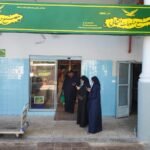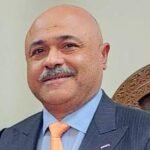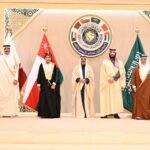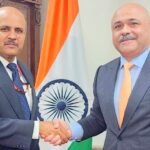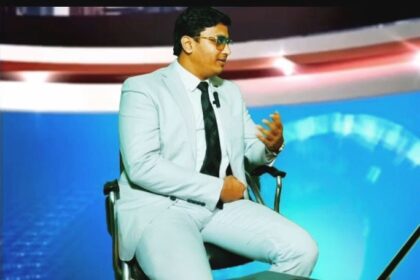
BY MOHAMMAD TARIQUE SALEEM FROM KUWAIT
The 45th session of the Gulf Cooperation Council (GCC) concluded on December 1 in Kuwait, marked by a significant press conference led by Kuwait’s Minister of Foreign Affairs, Abdullah Al-Yahya, alongside Jassem Al-Budaiwi, Secretary General of the GCC. The event showcased the collective determination of member states to strengthen regional cooperation and address pressing challenges in the Gulf region.
Abdullah Al-Yahya, a key figure in Kuwait’s foreign diplomacy, emphasized the importance of unity and collaboration among the GCC member states—Bahrain, Kuwait, Oman, Qatar, Saudi Arabia, and the United Arab Emirates. Reflecting on the council’s legacy, he stated, “The GCC has proven its resilience and relevance as a unifying body for the Gulf nations, fostering economic growth, security, and stability over the past four decades.”

The Minister underlined the council’s efforts to create a cohesive framework for addressing regional and international issues. He hailed the summit as a platform for open dialogue and strategic planning, which are essential to navigating the complex geopolitical landscape in the Gulf and beyond. The press conference revealed that the summit focused on a variety of topics, including economic integration, regional security, and environmental sustainability. Among the significant outcomes was an agreement to accelerate economic diversification efforts across member states, leveraging their collective strength to reduce dependency on oil revenues.
Minister Al-Yahya also noted the importance of fostering technological innovation, encouraging investments in renewable energy, and enhancing infrastructure development. “We recognize the need to prepare our economies for a future defined by sustainability and innovation,” he said. On the political front, the council reaffirmed its commitment to maintaining peace and stability in the Gulf region. Discussions included addressing the ongoing conflicts in neighboring countries and countering external threats to the region’s sovereignty. The leaders expressed unified support for dialogue and peaceful resolutions as the primary means to address these issues.

Jassem Al-Budaiwi, the GCC Secretary General, played a crucial role during the press conference, reiterating the council’s mission to foster regional integration and solidarity. He commended the leadership of Abdullah Al-Yahya and other foreign ministers for their efforts in ensuring the success of the summit. Al-Budaiwi highlighted the council’s achievements over the years, including significant strides in trade agreements, cultural exchange programs, and strategic partnerships with international organizations.
“The GCC is not just a regional alliance; it is a testament to what cooperation can achieve in a world of increasing challenges,” he remarked. Both leaders addressed the importance of collaboration in tackling global challenges such as climate change, food security, and public health. They announced the launch of new initiatives aimed at promoting green energy solutions and advancing environmental policies across the GCC states.
Abdullah Al-Yahya emphasized that Gulf countries are united in their responsibility to contribute positively to global efforts in combating climate change. “We are committed to achieving carbon neutrality goals and transitioning to a sustainable energy future,” he said, adding that the GCC would strengthen its partnerships with global stakeholders to achieve these objectives.
The conference concluded with a strong reaffirmation of Gulf solidarity, as Abdullah Al-Yahya and Jassem Al-Budaiwi called for continued unity among member states. The leaders pledged to overcome divisions and work towards a brighter, more prosperous future for the Gulf region.”Strength comes from unity,” Al-Yahya declared, echoing the core philosophy of the GCC. “The challenges we face today demand a collective response, and together, we can achieve stability, prosperity, and peace for our nations.”
The 45th session of the GCC highlighted the progress made by the council and the need for continued collaboration in addressing both regional and global issues. The leadership displayed by Abdullah Al-Yahya and Jassem Al-Budaiwi underscored the vital role of diplomacy and strategic partnerships in fostering a prosperous Gulf future.
As the GCC looks forward to its next summit, the spirit of unity and progress that defined the Kuwait meeting will remain a guiding principle. The outcomes of this session will undoubtedly shape the trajectory of the Gulf region in the years to come, ensuring that the GCC continues to be a pillar of strength and cooperation on the global stage.


